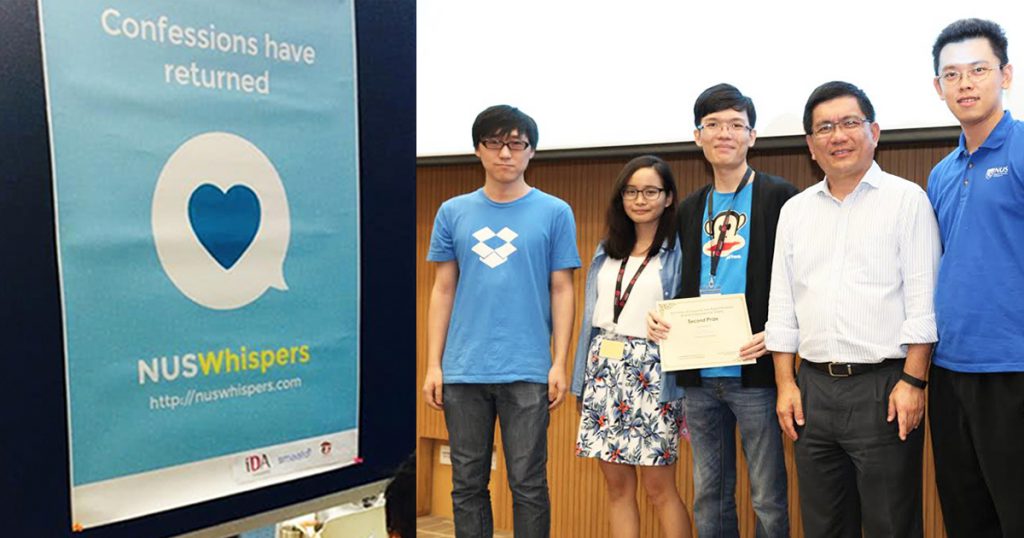Initially started out as a platform for students at the National University of Singapore (NUS), NUSWhispers has recently been getting attention from those beyond the school grounds as well.
The ‘dilution’ of context could be due the potential of posts to be shared by anyone, to anyone via Facebook, but perhaps, it’s the (unfortunately) viral nature of particularly juicy and scandalous posts that have caught the attention of not only netizens, but online publications as well.
But even before these posts, the platform has been thriving, especially among the NUS student community.
Launched last year on 7 April 2015, the page got 500 likes within the first day, and is currently holding strong at over 17,400 likes and counting.
However, what many don’t know is that NUSWhispers isn’t actually an entirely new concept, and is the successor of (the now inactive) NUS Confessions, a confessions-driven platform which was launched in 2013.
At its peak, the latter reached 30,000 likes within a year, but as with many school-based projects, its potential for growth was cut short after the founders graduated from the university.
Enter NUS School of Computing undergrads and NUSWhispers founders Melvin, Yichen, Erin and Yang Shun, who decided to, in their own capacity, create a brand new confession page for the university.
To get a deeper insight into the process of its setting up and unintended launch into mainstream fame, I caught up with Yang Shun, who very kindly answered my endless queries in spite of his busy schedule.
NUSWhispers: A Course Project That Took On A Life Of Its Own
Cheesy ~inspirational story~ origins aside, the platform was actually born out of a very practical necessity – to complete a module.
The founding team, which consisted of Melvin, Erin and Yichen, had to build a platform as part of a course project under a web development module in NUS School of Computing, which is now known as CS3226 – Web Programming and Applications.
Given his experience in web development over the years, Yang Shun, who was the tutor (while also being an undergrad) for their class, proposed the project idea and specifications for the trio to execute.

As to why they decided on embarking on a quest to create a platform for NUS student confessions, Yang Shun divulged that it was their mutual love for the school that inspired, and bonded them together to carry on the legacy set by their seniors.
It was like our baby that we did not want to abandon. We love NUS and enjoyed our time in school. We found that carrying on with NUSWhispers was a great way to keep in touch with the happenings in school.
What they also realised was that the previous NUS Confessions system lacked handy features like indexing and categorisation of entries, and also had a cumbersome moderation process.
So, instead of taking the easy way out and simply reclaiming the helms of what their seniors left behind, they came up with an entirely new platform, and fulfilled their student-ly obligations at the same time.
In spite of being relatively new to developing a web application, the team managed to design, build and launch the first iteration of the platform within 4 weeks.

Even after the module ended, their wish to give their peers a platform to confess their deepest, darkest secrets still persisted, and the trio, along with Yang Shun, took steps to bring the concept from class, to reality.
Teething Problems And “Shameless” Self-Promotion
The first thing the team needed was for the rest of campus to know about NUSWhispers, and as compared to simply passing it off as another student project, their School supported their cause, and gave the platform a shoutout on Facebook.

The team also leveraged on the popularity of NUSMods, a student initiative aiming to improve the school experience, to help in publicity.

However, while getting people hyped about the prospect of reading their peers’ deep, dark secrets came easy, the team inevitably faced teething problems – mainly because the platform was contributed content-heavy.
Gaining the trust of NUS students and having them submit their (albeit anonymous) confessions was a challenge, especially due to potential implications lest any identities are leaked.
Thus, the team had to engage in they called ‘manual labour’, as they took turns to self-generate initial content, self-comment on posts, and also “shamelessly self-bumping posts by liking and asking friends to like them”.
“Content is a chicken and egg problem. We initially seeded the platform with our own attempts at juicy confessions and shared them on our personal Facebook accounts to let the platform grow.”

However, his efforts were inevitably called out by an eagle-eyed user.

Eventually, contributions grew as the student body’s trust in them did, and the team now only focuses on moderation and management of the page.
“These days, we just let things take its course. In fact, we usually have no idea which confessions go viral when we were approving it.”
Exams, Politics And Moderation
With an open platform comes the inevitable occurrence of potentially offensive entries, and while they aren’t strictly restricting what can be posted, they have a set of guidelines that they adhere to.
“Users can submit whatever they want, but they may not be approved if they do not meet our approval guidelines. Our guidelines also change with time as we discover new content and trends in the posts we receive.”

Given his experience with NUSWhispers and moderation of entries, I asked there were any observable shifts in trends, and posts submitted.
“As the audience grew in size over the past few months, we have received a greater variety of posts from different walks of life. However, we try our best to keep it related to NUS.”
Matters of sex and relationships, exams, LGBT matters, politics (GE2015) and orientation camps were identified as popular confession topics, and when asked about recent ‘saga’ posts which have gained quite a bit of not-so positive attention, Yang Shun advices:
Take them with a pinch of salt. It’s probably time to learn that you can’t trust everything you see on the Internet, especially under the veil of anonymity.
However, while ‘anonymous’ platforms like these can attract naysayers and negativity, these posts simply make the positive ones stand out more.
For Yang Shun, the most memorable post to him so far was a confession from a student thanking his/her mother for her hard work:

“The support we got from the community in the comments section was amazing.”
The Future Of NUSWhispers And Its Team
Just like any student-run initiative, the platform, too, needed to deal with a change in core team, especially after 3/4 of the founders (except Yichen, who is in year 4 currently) donned their graduate robes in 2015.

Three of the founding team have since found themselves in promising careers in software and web engineering.
Currently, Melvin is a web engineer at Tech in Asia, Erin is a software engineer at DSO and Yang Shun is a software engineer at Grab, on top of maintaining and developing the new version of NUSMods.
While original members Yang Shun and Melvin aren’t completely hands off NUSWhispers, and are still on board alongside their juniors Nicholette and Zi Xuan, the process that goes into choosing succeeding members remains stringent.
With great power comes great responsibilities and the selected individuals must have a good heart; they are trusted not to misuse the platform. It is mostly a thankless job without any monetary incentive and hence the motivations have to be right.
University is, most importantly, a time for undergraduates to learn as much as they can before they enter working life, and this priority holds true in their selection process.
“Since managing the platform can be time consuming and distracting, we will tend to give priority to individuals who are strong academically and their studies will not be affected by the platform management.”
“Learn From The Experiences Of Others”
When asked what he and the team would like to tell the community who uses NUSWhispers, or equivalents from other universities, Yang Shun reiterated the importance of being discerning when it comes to online posts.
“Thank you for being such a great audience! But we stress that we do not have the ability to confirm nor deny any of these content. Learn from the experiences of others and hopefully it will come in useful one day for yourself.”
Also Read: The Brains Behind ‘Bus Uncle’, The Kopi-Offering Chatbot Who Keeps Us Entertained At Bus Stops










